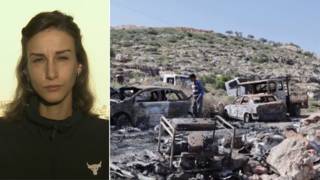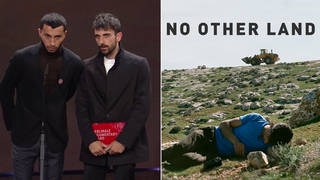
Related
Topics
Guests
- David Sirotainvestigative journalist, founder of The Daily Poster, editor-at-large at Jacobin and co-writer of the Netflix film Don’t Look Up.
We speak to longtime progressive journalist and 2020 Bernie Sanders adviser David Sirota, who was just nominated for an Academy Award for co-writing the screenplay of the hit Netflix movie “Don’t Look Up” along with the film’s director, Adam McKay. The satire of the fight to have climate change acknowledged, let alone acted upon by global leaders, follows the plight of astronomy professor Dr. Randall Mindy (played by Leonardo DiCaprio) and his graduate student Kate Dibiasky (Jennifer Lawrence) as they fail to warn the planet of an impending comet that threatens to wipe out human existence. The film shows audiences “how ridiculous and destructive our world has become when it comes to dealing constructively with science,” says Sirota. If corporate media tends to make light of serious issues, the film raises the larger question: “How do we actually make climate science salient in the political discourse?”
Transcript
AMY GOODMAN: “Don’t Look Up–Main Title Suite” by composer Nicholas Britell. The soundtrack to Don’t Look Up is an Oscar nominee for Best Original Score. This is Democracy Now! I’m Amy Goodman, with Juan González, as we turn to look at a new movie that’s been described as giving us a reason to look up during these dire times. The hit satire film, a parable about the climate crisis, Don’t Look Up, was nominated Tuesday for four Academy Awards: Best Picture, Best Original Score, Best Film Editing and Best Original Screenplay, which is interesting, because the film was co-written by the longtime progressive journalist David Sirota, who was a Bernie Sanders 2020 campaign adviser and speechwriter. He shares the nomination with the film’s director, Adam McKay. Don’t Look Up features some of Hollywood’s biggest actors, including Meryl Streep as president of the United States, Tyler Perry and Cate Blanchett as TV news anchors, and Jennifer Lawrence and Leonardo DiCaprio as scientists who try to warn the world about a comet on a direct collision course with Earth. We’ll talk with David Sirota about how the film came together in a minute, but first, the trailer.
RANDALL MINDY: [played by Leonardo DiCaprio] This is not real. This is not real. This is not real. This isn’t happening. Kate, tell me this isn’t really happening.
PRESIDENT ORLEAN: [played by Meryl Streep] I hear there’s something you don’t like the looks of.
RANDALL MINDY: We discovered a very large comet.
PRESIDENT ORLEAN: Oh! Good for you.
KATE DIBIASKY: [played by Jennifer Lawrence] It’s headed directly towards Earth.
TEDDY OGLETHORPE: [played by Rob Morgan] This comet is what we call a planet killer.
PRESIDENT ORLEAN: At this exact moment, I say we sit tight and assess.
RANDALL MINDY: Sit tight and assess?
KATE DIBIASKY: Sit tight.
JASON ORLEAN: [played by Jonah Hill] And then assess. The “sit tight” part comes first. Then you’ve got to digest it. That’s the assessment period.
RANDALL MINDY: This is the worst news in the history of humanity. They just blew us off.
KATE DIBIASKY: What are we going to do? We have to release the information.
RANDALL MINDY: So we just leak it.
BRIE EVANTEE: [played by Cate Blanchett] Our guests today have made a pretty big discovery in space.
JACK BREMMER: [played by Tyler Perry] How big is this thing, though? Like, can it destroy my ex-wife’s house? Is that possible?
KATE DIBIASKY: There’s a 100% chance that we’re all going to die!
RANDALL MINDY: Kate? Kate?
JACK BREMMER: OK.
BRIE EVANTEE: Well, the handsome astronomer can come back any time, but the yelling lady, not so much.
JACK BREMMER: Not so much.
RANDALL MINDY: We’re going to get the news out there, one way or another.
KATE DIBIASKY: It’s real, and it’s coming.
FBI AGENT: FBI!
KATE DIBIASKY: Jesus Christ! You could have just called me.
PETER ISHERWELL: [played by Mark Rylance] This comet contains $30 trillion worth of material.
RANDALL MINDY: What do trillions of dollars matter if we’re all going to die?
JASON ORLEAN: Oh no! What if we’re rich? That would be terrible!
RILEY BINA: [played by Ariana Grande] You guys discovered a comet? I have a tattoo of a shooting star on my back.
RANDALL MINDY: Oh, that’s — that’s terrific.
This could be a complete disaster.
KATE DIBIASKY: This is already a disaster.
RANDALL MINDY: [bleep]!
YULE: [played by Timothée Chalamet] You’re that girl from live TV who said we’re all going to die?
KATE DIBIASKY: No.
YULE’S FRIEND: [played by Jason Sanditen] Yo, bro!
BENEDICT DRASK: [played by Ron Perlman] You’ll never take me alive!
UNIDENTIFIED: There it is!
DJ CHELLO: [played by Kid Cudi] It’s a real comet.
RANDALL MINDY: Hurling its way towards Earth!
Can you see it?
KATE DIBIASKY: I can’t! My head is in a bag!
JASON ORLEAN: I did have the FBI put that bag over your head. They don’t do that. The CIA does. But I made them do it.
KATE DIBIASKY: You know, I had a feeling.
JASON ORLEAN: It’s a good feeling, because that is what I did, and it was very funny and cool.
AMY GOODMAN: That’s the trailer for the movie Don’t Look Up. For more, we’re joined by David Sirota, the award-winning investigative journalist, founder of the news website The Daily Poster, editor-at-large for Jacobin.
Welcome back, and congratulations on being nominated yesterday for an Oscar for Best Original Screenplay, along with director Adam McKay. David, how did you two come to write this major film? Talk about the response to it. It came out on Christmas Eve. It’s already one of the most watched Netflix movies of all time. And McKay credits you with the idea of using an asteroid as a metaphor for the climate crisis.
DAVID SIROTA: So, Adam McKay and I have been friends for a very long time. And after he made Vice, I was talking with him. Vice is the movie about Dick Cheney. I said to him, I said, “Listen, you need to use your superpowers of comedy and mixing comedy with politics — you need to use those superpowers for something about climate.” And he said, “Yeah, I know. I’ve been trying to figure out how to do something on climate, but I don’t really want to do a kind of Mad Max post-apocalyptic dystopia, and I’m trying to figure out what to do.”
And he and I were commiserating at one point a little while after that about the lack of coverage of climate change. I think I had written a story or reported something about climate change, and I was lamenting how I felt that — I sort of said that, you know, “Climate change, it sort of feels like an asteroid is headed towards Earth, and nobody really cares.” And he said, “Wait a minute. Maybe there’s an idea there. Maybe there’s a movie there.” And so we started spitballing scenes about the president and what would actually happen if a comet was headed towards Earth. And he essentially — after we had a bunch of scenes, he went, and he wrote a script, and he came back with notes.
And I kept sort of saying, “Yeah, are they really going to” — you know, I was excited, but I kept saying, “Are they really going to make this movie?” And he said, “Oh, we got Leonardo DiCaprio and Jennifer Lawrence excited about it.” And then, all of a sudden, he said, “We’re going to make this movie. We’re sending the paperwork over. This is actually happening.” And in the middle of COVID, in 2020, the late winter, they made the movie. And I was as shocked as anybody that they actually pulled it off.
But I think the movie has had such a great response because I think there is a pent-up demand for content about the climate crisis. This is an allegory for how we’re dealing with — or, really, not dealing with — the climate crisis. And I think people, on the screen, they see this movie showing them how ridiculous and destructive our world has become when it comes to dealing constructively with science — in particular, climate science.
JUAN GONZÁLEZ: And, David, first of all, I want to congratulate you. My wife and I watched it on Netflix several weeks ago, and we literally could not stop laughing throughout the entire film, and to the point that we were crying at points, that we were laughing so hard. But I wanted to ask you a couple things. One, the scenes in terms of the media response to the scientists coming on the shows, I wanted to get an idea of how — the thought that went into those scenes, and especially the new age executive in the film who comes up with the brilliant idea, supposedly, of mining the comet and being able to get rare earth minerals out of it in the process.
DAVID SIROTA: Well, the media part —
JUAN GONZÁLEZ: Who came up with that idea?
DAVID SIROTA: The media part, I’ll take that for the start. I mean, that was really at the core of everything and the idea, which is that the question that I think we all have to ask ourselves is: Are we at a point where the media so frivolizes important information and so tries to distract us from important information that we can’t actually act on that information even when scientists are grabbing us by the lapels and saying we have to act? And I think that in many cases, certainly when it comes to climate science, it really does feel like that, that the big challenge, among other things, is not just how do we deal with climate change on the policy — I think that we kind of know what we have to do — but how do we actually make climate science salient in the political discourse. And corporate media is really not all that interested in making climate science a central story. And so, I think that morning show set up in the movie really illustrates that.
On the question about mining the asteroid, that was an idea, again, at the beginning, that Adam and I were talking about. When we were kind of spitballing ideas of how ridiculous our world is, we said, you know, if there was any asteroid headed towards Earth, you know that there would be corporations that would be trying to come up with not just how to stop the meteor, but how to profit off of it. And that character, I think, that you see, the Mark Rylance character, is kind of an amalgam of a lot of these tech oligarchs in our society who are constantly saying that they’re going to save society, but, curiously enough, their proposals for saving society typically end up enriching them, that the alternatives to saving society that don’t involve giant corporate profits, that’s the kind of stuff that isn’t much talked about and isn’t much promoted by the most powerful people in our country.
AMY GOODMAN: So, I want to go to a few clips from Don’t Look Up. Juan, don’t start crying. The scientist characters, Dr. Randall Mindy, astronomy graduate student Kate Dibiasky and Dr. Oglethorpe, played by Leonardo DiCaprio, Jennifer Lawrence and Rob Morgan, meet the president of the United States, played by Meryl Streep.
TEDDY OGLETHORPE: This comet is what we call a planet killer.
RANDALL MINDY: That is correct.
PRESIDENT ORLEAN: So how certain is this?
RANDALL MINDY: There’s 100% certainty of impact.
PRESIDENT ORLEAN: Please, don’t say 100%.
SECRETARY OF INTERIOR: [played by Rob Lévesque] Can we just call it a potentially significant event?
JASON ORLEAN: Yeah.
TEDDY OGLETHORPE: Yes.
KATE DIBIASKY: But it isn’t potentially going to happen. It is going to happen.
RANDALL MINDY: Exactly, 99.78% to be exact.
JASON ORLEAN: Oh, great! OK, so it’s not 100%.
TEDDY OGLETHORPE: Well, scientists never like to say 100%.
PRESIDENT ORLEAN: Call it 70%, and let’s just — let’s move on.
KATE DIBIASKY: But it’s not even close to 70%.
PRESIDENT ORLEAN: You cannot go around saying to people that there’s a 100% chance that they’re going to die. You know? It’s just nuts. And we should get some of our scientists on this. You know, no offense, but you’re just two people that walked in here with —
TEDDY OGLETHORPE: Dr. Oglethorpe.
PRESIDENT ORLEAN: Dr. Ogilvy, yeah.
AMY GOODMAN: Well, when the president, Meryl Streep, treats the three scientists dismissively, they take their message to the public. In this scene, the scientists — again, played by Leonardo DiCaprio and Jennifer Lawrence — wait their turn in a green room to come on a morning show to discuss their findings.
STAGE MANAGER: [played by Ben Sidell] Jack and Brie are going to do like 10 on the SCOTUS nominee, and then, Riley Bina, you’ll come on and —
RILEY BINA: And I get to talk about my single, right? A portion of the profits goes to the manatee sanctuaries.
STAGE MANAGER: Yes, but the breakup first. And then, Dr. Mindy and Ms. Dibiasky, you’ll come on and talk about that planet you discovered.
RANDALL MINDY: Comet. We found a comet.
KATE DIBIASKY: They know what we’re here to talk about, right?
STAGE MANAGER: Of course. Jack and Brie love doing science segments. Just remember, keep it light, fun. Jack and Brie love having a good time.
KATE DIBIASKY: Well, that’s not promising.
RILEY BINA: You guys discovered a comet? That’s so dope. I have a tattoo of a shooting star on my back.
RANDALL MINDY: That’s terrific.
AMY GOODMAN: The actress with the tattoo is Ariana Grande. In this next scene from Don’t Look Up, the two scientists appear on the morning news show The Daily Rip, hosted by news anchors Brie and Jack, played by Cate Blanchett and Tyler Perry.
JACK BREMMER: How big is this thing? Could it, like, destroy someone’s house? Is that possible?
RANDALL MINDY: Well, Comet Dibiasky, which is what it will officially be named —
JACK BREMMER: After her. After — yeah, what an honor!
BRIE EVANTEE: Oh, congratulations!
JACK BREMMER: Yeah, right. Congratulations!
RANDALL MINDY: It’s somewhere between six and nine kilometers across. So —
BRIE EVANTEE: It’s big.
RANDALL MINDY: It would damage the — the entire planet, not just a house. You know.
JACK BREMMER: The entire planet, OK. Well, as it’s damaging, will it hit this one house in particular that’s right on the coast of New Jersey? It’s my ex-wife’s house. I need it to be hit. Can we make that happen?
BRIE EVANTEE: Come on. You and — you and Jenny have a great relationship. No, you stop.
JACK BREMMER: Listen, in all —
BRIE EVANTEE: You need to stop.
JACK BREMMER: I will, but, in all fairness, I actually paid for the house.
BRIE EVANTEE: I’m going to poke you to death with this pen. I am so sorry.
KATE DIBIASKY: I’m so sorry. Are we — are we not being clear? We’re trying to tell you that the entire planet is about to be destroyed!
JACK BREMMER: OK.
BRIE EVANTEE: OK. Well, it’s, you know, just something we do around here. You know, we just keep the bad news light.
JACK BREMMER: Right. It helps the medicine go down.
AMY GOODMAN: That’s a clip from Don’t Look Up, the Netflix blockbuster. David Sirota, our guest. David, how did your experience working with Senator Bernie Sanders influence how you talk about the media? Also, as the president changes — I’m sorry that the first woman president is the lunatic that she is.
DAVID SIROTA: Well, the experience of working for Bernie Sanders — I mean, one of Bernie’s, I think, criticisms of the media is that the media doesn’t take serious issues seriously. And I worked for Bernie 20-plus years ago on Capitol Hill, and I worked for him on his 2020 presidential campaign. And that criticism of his, I think, he aired that back then, he aired that on the 2020 campaign, he still says it today, and I think it’s absolutely accurate. And it’s not really about him and how they treat him. It’s about how corporate media treats really serious issues of the day. I mean, again, when it comes to something like climate, corporate media, I think, has not taken climate seriously.
I mean, I’ve said this before, I’ll say it again: The way to take climate change seriously in news coverage is to bake it into the day-to-day coverage. We know what that looks like. The economy is baked into day-to-day coverage of politics and of our society. Climate is seen, at best, as a story over here that gets covered once in a while and then kind of goes away. But climate really is everything. I mean, it is the livable ecosystem.
And I want to say this: I think Democracy Now!, I think independent media, is the solution to this. So, I just want to be clear that I’m not including Democracy Now! and the great work that you do in that. But I think there’s an important point there, that corporate media knows who signs its paycheck. It knows what its sponsors really want. And that’s part of why these issues don’t get the centrality of the coverage that they need to get in our news discourse. And that’s why I really believe independent media is so important. It’s why I work at The Daily Poster. It’s why I love what you guys do. And I think everyone listening needs to understand how important independent media really is.
AMY GOODMAN: Finally, I wanted to go to a different issue, from your role as a script writer to The Daily Poster and the exposé on California’s single-payer healthcare going down, your searing critique of the governor there. Could you talk about what happened, David, very quickly?
DAVID SIROTA: Sure. Gavin Newsom had campaigned — the governor of California had campaigned on a very explicit promise to lead the fight for single-payer healthcare. I mean, he was extremely explicit about that. He said he was actually tired of politicians putting it off. A single-payer bill came to the California Assembly, a serious single-payer bill. Gavin Newsom — this is a couple weeks ago. Gavin Newsom, all of the sudden, went silent and then started making comments as if he was hedging, as if he was backing off.
Well, what happened in the middle of that? Well, what we reported at The Daily Poster was a large health insurance company dumped a million dollars into the California Democratic Party. And other health insurers gave him, his campaign and the California Democratic infrastructure lots of money. And ultimately what happened was the California Democratic Assembly did not allow even a vote, a full vote, on that single-payer bill. So, in my view, the story is somebody went out and campaigned on something, a huge amount of money went in, and then out came an outcome of killing the bill. That’s what we reported at Daily Poster.
AMY GOODMAN: And you’re changing the name of Daily Poster, David?
DAVID SIROTA: Yes, we’re soon going to be The Lever. We’re going to be expanding. I hope people will check us out, DailyPoster.com. By the way, we have a special, if people want to subscribe, a special discount for all Democracy Now! listeners. You can find it at DailyPoster.com/democracynow. We believe in supporting independent media. And I just want to congratulate you, Amy and Juan, seriously. I rely on you so much for an inspiration and for your daily reporting. It is the antidote to the kinds of things that we show in this movie Don’t Look Up.
AMY GOODMAN: Well, David, thanks so much for being with us, David Sirota, award-winning investigative journalist, founder of the news website The Daily Poster, editor-at-large for Jacobin, served as adviser and speechwriter for Senator Bernie Sanders during his presidential campaign, has just been nominated for an Oscar for Best Original Screenplay for the Netflix blockbuster Don’t Look Up. He shares the nomination with the film’s director, Adam McKay. The film also nominated for Best Picture, Best Original Score and Best Film Editing.












Media Options